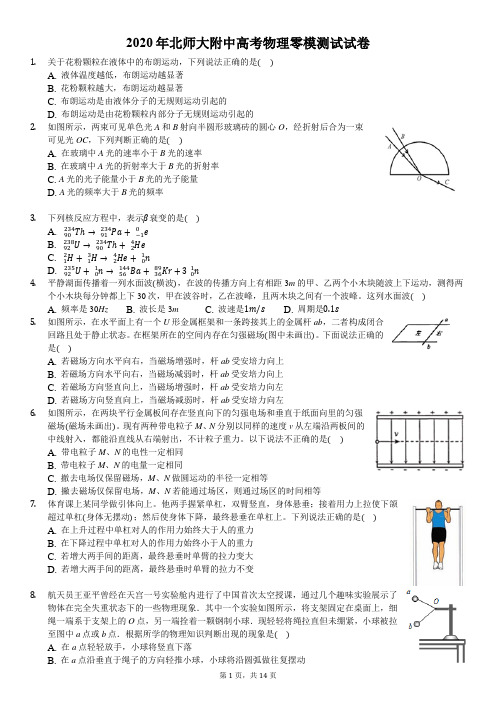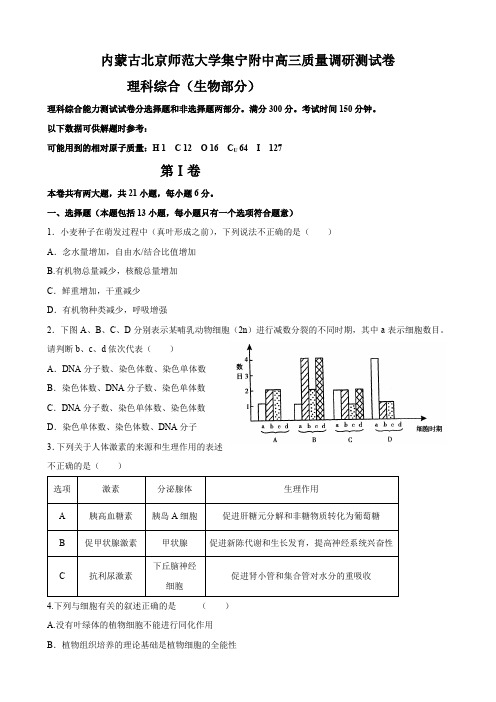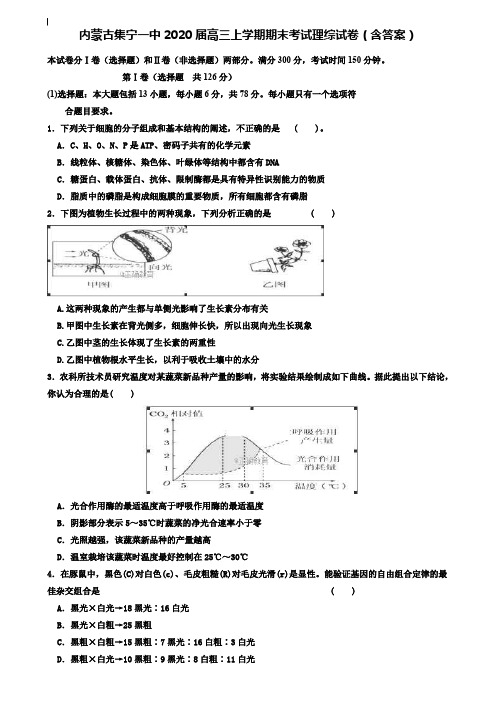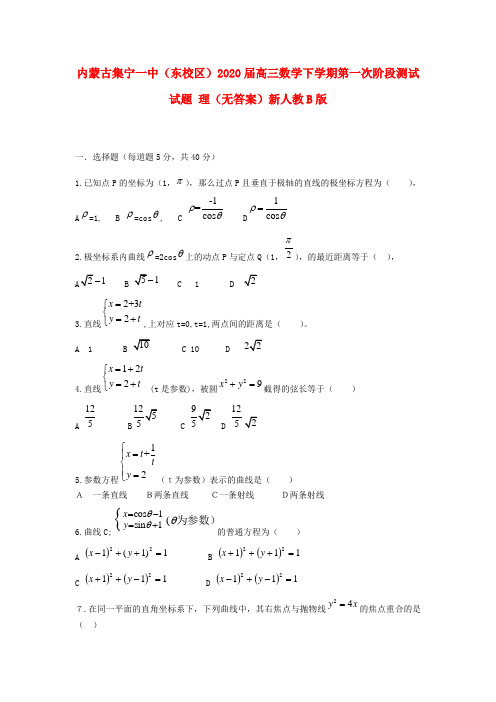北师大集宁附中2020届高三测试 无答案
内蒙古集宁二中2019-2020学年第二学期高三质量检测 理科综合 试卷(无答案)

集宁二中2019-2020年度第二学期质量检测理科综合一、选择题:共13小题,每题6分,共78分,每题只有一个答案符合要求。
1、下列实验中,没有用到酸的是 ( )A.观察细胞中DNA和RNA的分布B.测定胃蛋白酶的最适温度C.绿叶中色素的提取和分离D.观察植物根尖细胞的有丝分裂2、下列关于细胞结构和功能的叙述,正确的是 ( )A.洋葱根尖分生区细胞有中心体,与细胞有丝分裂有关B.原核细胞没有核膜,转录和翻译在细胞质中进行C.浆细胞合成的抗体通过载体蛋白运输到细胞外D.人体神经元有树突和轴突,一个神经元能完成完整的反射活动3、下列有关疫苗的叙述,错误的是()A.疫苗具有广谱预防的功能,例如接种牛痘疫苗能预防天花病毒B.疫苗通常用灭活或减毒的病原体制成,能刺激机体产生相应的抗体和记忆细胞C.疫苗可通过注射或口服进入人体,可以用来预防疾病D.疫苗一般是一类接种后能激发人体免疫反应来抵抗某些传染病的生物制品4、下列有关细胞生命历程的说法,正确的是()A.有丝分裂和减数分裂都可能发生非同源染色体间的互换,但是只有减数分裂能发生同源染色体间的交叉互换B.原癌基因和抑癌基因发生多次变异积累可导致癌症,因此癌症可遗传C.细胞周期的有序进行需抑癌基因的严格调控D.皮肤上的“老年斑”是细胞凋亡的5.《贵州省生态文明建设促进条例》是全国首部省级生态文明建设条例,条例中提出:围绕“治山、治气、治水、治土”,加大对生态环境的保护与治理力度。
下列相关叙述正确的是()A.“治山”退耕还林还草属于群落的初生演替B.“治土”提倡生态农业的设计原则是使生态系统中的物质和能量被分层次多级利用C.“治气”通过减少化石燃料的燃烧就可以达到目标D.“治水”通过物理沉降、化学分解和生物分解可以很快清除污染6.下列选项中能利用相关现象正确解释生物学概念的是 ( )A.减Ⅰ前期同源染色体的非姐妹染色单体交叉互换的现象可以用来解释基因的自由组合B.黄圆豌豆和绿皱豌豆杂交,子代出现黄皱豌豆和绿圆豌豆的现象可以用来解释性状分离C.位于X或Y染色体上的基因,其相应的性状表现与一定的性别相关联的现象可以用来解释伴性遗传D.研究烟草花叶病毒遗传信息的传递途径,可以用来解释克里克提出的中心法则克里克提出的中心法则7、下列关于文献记载的说法正确的是()A.《天工开物》中“世间丝麻裘褐皆具素质”,文中“丝、麻”的主要成分都是蛋白质B.《肘后备急方》中“青蒿一握,以水二升渍,绞取汁”,该提取过程属于化学变化C.《抱朴子》中“丹砂(HgS)烧之成水银,积变又还成丹砂”,描述的是升华和凝华过程D.《本草纲目》中“用浓酒和糟入甑,蒸令气上,用器承滴露”,涉及的实验操作是蒸馏8、2018年11月,在法国凡尔赛召开的国际计量大会(CGPM)第26次会议将阿伏加德罗常数的定义修改为“1摩尔包含6.02214076×1023个基本单元,这常数被称为阿伏加德罗常数,单位为mol−1”。
2020年北师大附中高考物理零模测试试卷

2020年北师大附中高考物理零模测试试卷1.关于花粉颗粒在液体中的布朗运动,下列说法正确的是()A. 液体温度越低,布朗运动越显著B. 花粉颗粒越大,布朗运动越显著C. 布朗运动是由液体分子的无规则运动引起的D. 布朗运动是由花粉颗粒内部分子无规则运动引起的2.如图所示,两束可见单色光A和B射向半圆形玻璃砖的圆心O,经折射后合为一束可见光OC,下列判断正确的是()A. 在玻璃中A光的速率小于B光的速率B. 在玻璃中A光的折射率大于B光的折射率C. A光的光子能量小于B光的光子能量D. A光的频率大于B光的频率3.下列核反应方程中,表示β衰变的是()A. 90234Tℎ→ 91234Pa+ −10eB. 92238U→ 90234Tℎ+ 24HeC. 12H+ 13H→ 24He+ 01nD. 92235U+ 01n→ 56144Ba+ 3689Kr+3 01n4.平静湖面传播着一列水面波(横波),在波的传播方向上有相距3m的甲、乙两个小木块随波上下运动,测得两个小木块每分钟都上下30次,甲在波谷时,乙在波峰,且两木块之间有一个波峰。
这列水面波()A. 频率是30HzB. 波长是3mC. 波速是1m/sD. 周期是0.1s5.如图所示,在水平面上有一个U形金属框架和一条跨接其上的金属杆ab,二者构成闭合回路且处于静止状态。
在框架所在的空间内存在匀强磁场(图中未画出)。
下面说法正确的是()A. 若磁场方向水平向右,当磁场增强时,杆ab受安培力向上B. 若磁场方向水平向右,当磁场减弱时,杆ab受安培力向上C. 若磁场方向竖直向上,当磁场增强时,杆ab受安培力向左D. 若磁场方向竖直向上,当磁场减弱时,杆ab受安培力向左6.如图所示,在两块平行金属板间存在竖直向下的匀强电场和垂直于纸面向里的匀强磁场(磁场未画出)。
现有两种带电粒子M、N分别以同样的速度v从左端沿两板间的中线射入,都能沿直线从右端射出,不计粒子重力。
内蒙古集宁一中(西校区)2020届高三语文上学期第二次月考试题(无答案)

集宁一中2018——2019年高三语文上半学期第二次月考试题―、现代文阅读(37分〉㈠述类文本阅读(每小题3分,9分)阅读下面的文字,完成1-3题。
①随着不惜一切代价追求一味追求GDP的发展模式暴露出越来越多的问题,政府近来反复强调转换经济增长方式,强调经济和社会的“又好又快”发展,明确把“好”的标准提到首位,而不再简单地重复“发展是硬道理”。
这是一个信号:中国的经济增长方式和社会发展模式将发生重大转变。
面对这一历史性的转变,思想文化界必须回答的问题是:这种转变需要什么样的文化支持?没有相应的文化转型,经济和社会发展模式的转变能够独立完成吗?②很长一段时间以来,我们对于“好”的理解主要集中在环保、低耗、节能等方面,是环境、能源等方面的指标。
节能、低碳、绿色、宜居等等已经被确立为社会发展的重要考核指标。
转变经济增长方式、优化产业结构、大力发展文化产业、建设宜居城市等,也成为政治家和知识分子的口头禅。
③这些当然都是必要的,但是还不够。
因为这些指标基本上还是着眼于经济,“转变经济增长方式”的核心概念依然是“经济”:如果高能耗、高污染的增长方式继续下去,中国的经济就无法持续增长。
但是经济的持续增长是“好”的全部含义么?换言之,如果高能耗、高污染的发展能够持续下去,它就应该坚持吗?我以为不是。
在经济增长的“好”背后还有一个更加根本性的标准,这就是“好生活”。
“好生活”的“好”是一个综合评价指标,它当然应该包括好的经济增长方式,但是又不仅仅是好的经济增长方式,它还应该包括:好(合理)的政治体制、好(优良)的道德环境、好(正确)的价值观和世界观、好(和谐)的人际关系、好(愉快)的心情等。
也就是说,好的经济增长方式之所以好,是因为它和社会生活的其他方面是协调一致,相互支持的。
因此,这个问题不是单纯的经济问题,也不是光靠经济学就能解决的问题。
“好生活”的问题是一个文化的问题。
好生活的问题是一个涉及到社会及政治、经济、道德、哲学等诸多层面的问题,能够概括这些层面的最合适术语,我以为是文化。
内蒙古北京师范大学集宁附中高三质量调研测试卷(生物).doc

内蒙古北京师范大学集宁附中高三质量调研测试卷理科综合(生物部分)理科综合能力测试试卷分选择题和非选择题两部分。
满分300分。
考试时间150分钟。
以下数据可供解题时参考:可能用到的相对原子质量:H 1 C 12 O 16 C U 64 I 127第Ⅰ卷本卷共有两大题,共21小题,每小题6分。
一、选择题(本题包括13小题,每小题只有一个选项符合题意)1.小麦种子在萌发过程中(真叶形成之前),下列说法不正确的是()A.念水量增加,自由水/结合比值增加B.有机物总量减少,核酸总量增加C.鲜重增加,干重减少D.有机物种类减少,呼吸增强2.下图A、B、C、D分别表示某哺乳动物细胞(2n)进行减数分裂的不同时期,其中a表示细胞数目。
请判断b、c、d依次代表()A.DNA分子数、染色体数、染色单体数B.染色体数、DNA分子数、染色单体数C.DNA分子数、染色单体数、染色体数D.染色单体数、染色体数、DNA分子3.下列关于人体激素的来源和生理作用的表述不正确的是()4.下列与细胞有关的叙述正确的是()A.没有叶绿体的植物细胞不能进行同化作用B.植物组织培养的理论基础是植物细胞的全能性C.细胞分化是细胞形态、结构、遗传物质发生稳定性差异的过程D.癌细胞容易分散和转移是由于细胞内水分减少导致的5.豌豆种皮灰色(G)对白色(g)为显性,黄子叶(Y)对绿子叶(y)为显性,现有GGYY与ggyy杂交得F1,F1自交得F2。
F2植株所结种子的种皮颜色的分离比和子叶颜色的分离比分别是()A.3:1 和3:1 B.9:3:3:1和3:1C.5:3 和9:3:3:1 D.3:1和5:3第Ⅱ卷(非选择题,共174分)30.Ⅰ.(11分,每空1分)下图是人体的蛋白质的代谢途径图解。
请据图回答:(1)参与过程①所需的酶有________________,此外还需要的物质有___________。
(2)生理过程③是__________作用;生理过程②是___________作用,该作用的结果改变了氨基酸的________________(种类、数量或种类和数量)。
(附加20套期末模拟试卷)内蒙古集宁一中2020届高三上学期期末考试理综试卷(含答案)

内蒙古集宁一中2020届高三上学期期末考试理综试卷(含答案)本试卷分Ⅰ卷(选择题)和Ⅱ卷(非选择题)两部分。
满分300分,考试时间150分钟。
第Ⅰ卷(选择题共126分)(1)选择题:本大题包括13小题,每小题6分,共78分。
每小题只有一个选项符合题目要求。
1.下列关于细胞的分子组成和基本结构的阐述,不正确的是 ( )。
A.C、H、O、N、P是ATP、密码子共有的化学元素B.线粒体、核糖体、染色体、叶绿体等结构中都含有DNAC.糖蛋白、载体蛋白、抗体、限制酶都是具有特异性识别能力的物质D.脂质中的磷脂是构成细胞膜的重要物质,所有细胞都含有磷脂2.下图为植物生长过程中的两种现象,下列分析正确的是( )A.这两种现象的产生都与单侧光影响了生长素分布有关B.甲图中生长素在背光侧多,细胞伸长快,所以出现向光生长现象C.乙图中茎的生长体现了生长素的两重性D.乙图中植物根水平生长,以利于吸收土壤中的水分3.农科所技术员研究温度对某蔬菜新品种产量的影响,将实验结果绘制成如下曲线。
据此提出以下结论,你认为合理的是( )A.光合作用酶的最适温度高于呼吸作用酶的最适温度B.阴影部分表示5~35℃时蔬菜的净光合速率小于零C.光照越强,该蔬菜新品种的产量越高D.温室栽培该蔬菜时温度最好控制在25℃~30℃4.在豚鼠中,黑色(C)对白色(c)、毛皮粗糙(R)对毛皮光滑(r)是显性。
能验证基因的自由组合定律的最佳杂交组合是( )A.黑光×白光→18黑光∶16白光B.黑光×白粗→25黑粗C.黑粗×白粗→15黑粗∶7黑光∶16白粗∶3白光D.黑粗×白光→10黑粗∶9黑光∶8白粗∶11白光5.下图表示生物新物种形成的基本环节,下列叙述正确的是 ( ) ( )A.自然选择过程中,直接受选择的是基因型,进而导致基因频率的改变B.同一物种不同种群基因频率的改变能导致种群基因库的差别越来越大,但生物没有进化C.地理隔离能使种群基因库产生差别,必然导致生殖隔离D.种群基因频率的改变是产生生殖隔离的前提条件6.生态系统的结构包括生态系统的组成成分和食物链、食物,下列关于生态系统组成成分的叙述,正确的是 ( )①凡是细菌、真菌都是分解者②凡是自养型生物都是生产者③植物都是生产者④动物都是消费者⑤异养型生物都是消费者(3)②B.②③C.③④D.②⑤7.下列溶液蒸干并灼烧,最后得到固体是溶质本身的是( )A. CuSO4B. NaHCO3C. MnO4D. FeCl38.在25℃时,用蒸馏水稀释1 mol·L-1氨水至0.01 mol·L-1,随溶液的稀释,下列各项中始终保持增大趋势的是()A. B. C. D. c(OH-)9.下列说法正确的是()A. 相同温度下,将足量氯化银固体分别放入相同体积的①蒸馏水、②0.1 mol·L-1盐酸、③0.1 mol·L-1氯化镁溶液、④0.1 mol·L-1硝酸银溶液中,Ag+浓度:①>④=②>③B. 为确定某酸H2A是强酸还是弱酸,可测NaHA溶液的pH。
内蒙古集宁一中(东校区)2020届高三化学下学期第三次阶段测试试题(无答案)新人教版

内蒙古集宁一中(东校区)2020届高三化学下学期第三次阶段测试试题(无答案)新人教版第I卷(选择题,共42分)一、选择题(本题共7个小题,每题只有一个选项符合题意,每题6分,共42分)1、已知阿伏加德罗常数为NA,下列说法正确的是()A.1mol钠与足量氧气反应生成Na2O或Na2O2时,失电子数目均为NAB.1mol Na2O2与足量CO2反应时,转移2NA个电子C.1mol/L的NaOH溶液中含Na+数目NAD.1mol Na2O2晶体中含有的阴离子数目为为2NA2、在一定的温度下,向饱和的烧碱溶液中放入一定量的过氧化钠,充分反应后恢复到原来的温度,下列说法正确的是 ( )A.溶液中Na+浓度增大,有O2放出B.溶液中OH-总数不变,有O2放C.溶液的pH增大,有O2放出D.溶液中Na+总数减少,有O2放出3、氧化还原反应中,水的作用可以是氧化剂、还原剂、既是氧化剂又是还原剂、既非氧化剂又非还原剂等。
下列反应与Br2+SO2+2H2O=H2SO4+2HBr相比较,水的作用不相同的是( )A.2Na2O2+2H2O=4NaOH+O2↑B.4Fe(OH)2+O2+2H2O=4Fe(OH)3C.2F2+2H2O=4HF+O2D.Cl2 + H2O = 2H+ + Cl- + ClO-4、(NH4)2SO4在高温下分解,产物是SO2、H2O、N2和NH3。
在该反应的化学方程式中,化学计量数由小到大的产物分子依次是 ( )A.SO2、H2O、N2、NH3B.N2、SO2、H2O、NH3C.N2、SO2、NH3、H2OD.H2O、NH3、SO2、N25、物质的量之比为2:5的锌与稀硝酸反应,若硝酸被还原的产物为N2O,反应结束后锌没有剩余,则该反应中被还原的硝酸与未被还原的硝酸的物质的量之比是( )A. 1:4B.1:5C. 2:3D.2:56、等物质的量的N2、O2、CO2混合气体通过Na2O2后,体积变为原体积的8/9(同温同压),这时混合气体中N2、O2、CO2物质的量之比为()A.3∶4∶1B.3∶3∶2C.6∶7∶3D.6∶9∶07、某温度下,w g某物质在足量氧气中充分燃烧,其燃烧产物立即与过量的Na2O2反应,固体质量增加w g。
内蒙古集宁一中(东校区)2020届高三数学下学期第四次阶段测试试题 文(无答案)新人教B版

内蒙古集宁一中(东校区)2020届高三数学下学期第四次阶段测试试题 文(无答案)新人教B 版一、选择题(每小题5分,共60分)1.已知集合2{|22},{|log (1)},M x x N x y x M N =-≤<==-I 则= ( ) A .{|20}x x -≤< B .{|10}x x -<< C .{|12}x x << D .{—2,0}2.不等式222<-x 的解集是 ( ) A .(-1,1) B .(-2,2) C .(-1,0)⋃(0,1) D .(-2,0)⋃(0,2) 3 已知变量x,y 满足约束条件,则z=x+2y 的最小值为 ( )(A)3 (B)1 (C)-5 (D)-64.已知角θ的顶点为坐标原点,始边为x 轴的非负半轴,若()m P ,3-是角θ终边的一点,且1313sin =θ,则m 的值为 ( )A .21B .6C .21-或21 D . 6-或65.已知点A(1,3),B(4,-1),则与向量AB 同方向的单位向量为 ( )A. (53,54-)B.(54,53-)C. (53-,54)D. (54-,53)6.函数y =lg|x|x的图像大致是 ( )7.x x x f 2log 1)(+-=的一个零点落在下列哪个区间 ( )A.(0,1)B.(1,2) C (2,3) D.(3,4)8.等比数列{n a }中,1a =1,公比q=2,则数列{2n a }的前4项和为4S =( )A .85B .225C .15D .72259.若ABC ∆的三个内角满足sin A ∶sin B ∶sin C=5∶11∶13,,则ABC ∆的形状为( )A.直角三角形B.锐角三角形C.钝角三角形D.可能是锐角三角形,也可能是钝角三角形10.已知函数()x x x x f cos 3sin cos )(-=,则下列正确的是( )A.函数()x f 的周期为π2B.函数()x f 在区间⎥⎦⎤⎢⎣⎡-6,6ππ上单调递增C.函数()x f 的图象关于直线12π-=x 对称 D.函数()x f 的图象关于点⎪⎭⎫ ⎝⎛0,6π对称 11.设{an}是等比数列,则“a1<a2<a3”是“数列{an}是递增数列”的 ( )(A)充分而不必要条件 (B)必要而不充分条件(C)充分必要条件 (D)既不充分也不必要条件12. 已知P,Q 为抛物线x2=2y 上两点,点P,Q 的横坐标分别为4,-2,过P,Q 分别作抛物线的切线,两切线交于点A,则点A 的纵坐标为 ( )(A)1 (B)3 (C)-4 (D)-8二、填空题(每小题5分,共20分)13.已知α是第二象限的角,tan α=-21,则cos α= 。
2020年北京师范大学附属中学高三语文第四次联考试题及答案

2020年北京师范大学附属中学高三语文第四次联考试题及答案一、现代文阅读(36分)(一)现代文阅读I(9分)阅读下面的文章,完成下面小题。
马兰花李德霞大清早,马兰花从蔬莱批发市场接了满满一车菜回来,车子还没扎稳,邻摊卖水果的三孬就凑过来说:“兰花姐,卖咸菜的麻婶出事了。
”马兰花一惊:“出啥事啦?”三孬说:“前天晚上,麻婶收摊回家后,突发脑溢血,幸亏被邻居发现,送到医院里,听说现在还在抢救呢。
”马兰花想起来了,难怪昨天就没看见麻婶摆摊卖咸菜。
三孬又说:“前天上午麻婶接咸菜钱不够,不是借了你六百块钱吗?听说麻婶的女儿从上海赶过来了,你最好还是抽空跟她说说去。
”整整一个上午,马兰花都提不起精神来,不时地瞅着菜摊旁边的那块空地发呆。
以前,麻婶就在那里摆摊卖咸莱,不忙的时候,就和马兰花说说话,聊聊天。
有时买菜的人多,马兰花忙不过来,不用招呼,麻婶就会主动过来帮个忙……中午,跑出租车的男人进了菜摊。
马兰花就把麻婶的事跟男人说了。
男人说:“我开车陪你去趟医院吧。
一来看看麻婶,二来把麻婶借钱的事跟她女儿说说,免得日后有麻烦。
”马兰花就从三孬的水果摊上买了一大兜水果,坐着男人的车去了医院。
麻婶已转入重症监护室,还没有脱离生命危险。
门口的长椅上,麻婶的女儿哭得眼泪一把,鼻涕一把。
马兰花安慰了一番,放下水果就出了医院。
男人撵上来,不满地对马兰花说:“我碰你好几次,你咋不提麻婶借钱的事?”马兰花说:“你也不看看,这是提钱的时候吗?”男人急了:“你现在不提,万一麻婶救不过来,你找谁要去?”马兰花火了:“你咋尽往坏处想啊?你就肯定麻婶救不过来?你就肯定人家会赖咱那六百块钱?啥人啊?”男人铁青了脸,怒气冲冲地上了车。
一路上,男人把车开得飞快。
第二天,有消息传来,麻婶没能救过来,昨天下午死在了医院里。
麻婶的女儿火化了麻婶,带着骨灰连夜飞回了上海。
男人知道后,特意赶过来,冲着马兰花吼:“钱呢?麻婶的女儿还你了吗?老子就没见过你这么傻的女人!”男人出门时,一脚踢翻一只菜篓子,红艳艳的西红柿滚了一地。
2020年北师大附属实验中学高三语文期末试题及答案解析

2020年北师大附属实验中学高三语文期末试题及答案解析一、现代文阅读(36分)(一)现代文阅读I(9分)阅读下面的文字,完成下面小题。
捉弄契诃夫一个晴朗的冬日中午,严寒,冻得树喀喀作响。
娜坚卡①挽着我的胳膊,两鬓的卷发、嘴上的茸毛上,蒙着薄薄的银霜。
我们站在高山上。
从脚下到平地伸展着一溜斜坡,雪坡在阳光的照耀下,镜子一样闪闪发光。
我们身边,放着小小的轻便雪橇。
“我们一块儿滑下去,娜杰日达·彼得罗夫娜!”我央求,“只滑一次!我保证:不会伤一根毫毛。
”可是娜坚卡害怕。
从她那小小的胶皮套鞋到冰山脚下这段距离,在她看来像深不可测的地穴。
我刚邀她坐上雪橇,她往下一看,倒抽一口冷气,连呼吸都停了。
要是她当真飞向深渊会怎祥?她会吓死的,吓疯的。
“求求您!”我又说,“不要害怕!您要明白,您这是缺少毅力,胆怯!”娜坚卡最后让步了,看她的脸色我知道,她是冒着生命危险让步的。
我扶她坐到小雪橇上,搂着这个脸色苍白、浑身打颤的姑娘,跟她跌进深渊。
雪橇飞去,劈开的空气迎面袭来,在耳衅怒吼,凶狠地撕扯着衣帽,刀割般刺痛脸颊。
风的压力下,几乎难以呼吸。
像魔鬼用铁爪把我们紧紧抓住,咆哮着要把我们拖进地狱。
周围的景物汇成一条长长的忽闪而过的带子……再过一秒钟,就要粉身碎骨了!“我爱你,娜佳!”我小声说。
雪橇越来越平缓,风的吼声和滑木的沙沙声已不那么可怕,呼吸也不再困难,终于到了山脚。
娜坚卡已经半死不活,脸色煞白,奄奄一息……我帮她站起来。
“说什么也不滑了,”她睁大恐惧的眼睛望着我,“一辈子也不滑了!”一会儿,她回过神来,眼睛探察我:那句话是我说的,还是旋风的呼啸中她的幻听?我呢,专心致志地检查手套。
她挽起我的胳膊,在山下又玩了好久。
那个谜显然搅得她心绪不宁。
那句话是说了吗?说了还是没说?这可是一个有关她的自尊心、名誉、生命和幸福的问题,世界上头等重要的问题。
娜坚卡不耐烦地、忧郁地打量我的脸,胡乱回答我的问话,等着我再说出那句话。
2020届北师大附属实验中学高三语文上学期期末试卷及参考答案

2020届北师大附属实验中学高三语文上学期期末试卷及参考答案一、现代文阅读(36分)(一)现代文阅读I(9分)阅读下面作品,完成各题。
在河西走廊聆听苏沧桑从江南到河西走廊,从东海边到祁连山下,地势渐渐隆起,水汽渐渐稀薄,渐渐稀薄的还有人间烟火。
面对广袤,轻微缺氧的头脑有点混沌,耳朵却变得灵敏,或并非灵敏,是混沌中生出的幻听。
先听见九月的风里响起一声驼铃。
一匹灰白色骆驼驮着我,穿行在张掖丹霞地貌的壮丽中。
骆驼停留在一棵蓬蓬草前,打了一个响鼻,我听见脚下古老的土地响起流水声,叮叮咚咚,像一声声泉的耳语,从骆驼刺和蓬蓬草的叶尖涌出地面,汇集成浩瀚的绿意,幻化成远古时代的汪洋。
光阴煮海,熬成这片地貌,糖果般多彩,冰川般肃穆。
经过峡谷某个拐角处时,骆驼和我一起向上仰望,我顺着它的视线伸出手,在红色崖壁的沙砾中摸到一颗极小的贝壳。
亿万年来,这颗小小的贝壳,经历了陨石雨,沸腾的岩浆,汹涌的海水,生命诞生,人类进化,金戈铁马……直到此刻,它和大海一起被时间定格成无边的静美。
站在彩色丘陵的高处,我听到猎猎风声里响起苍凉悠远的乐声,嘟嘟克笛孤独的音色,如游刃穿行于风中,引领着长号、提琴、定音鼓等,如泣如诉的旋律渐渐恢弘。
眼前一层一层的山浪向着同一个方向倾斜,天上一层一层的白云也向着同一个方向倾斜,像一支支队伍在雄浑的音乐里行进,时光之河浩浩荡荡穿过河西走廊。
我看见光线急速变幻中一张张年轻的脸,年轻的张骞开启出使西域的凿空之旅,年轻的骠骑将军霍去病策马扬鞭,年轻的玄奘独自踏上西行的生死旅途,年轻的一行行驼队掠过地平线上的落日,足印迅速被风沙吹老。
历史与今天、东方与西方、古典与现代……文明之光在这里闪耀。
时间深处,日夜萦绕着一曲曲动人的音律。
古为河西四郡之一的张掖是丝绸之路重镇,这里荒漠与绿洲共存,南国风韵与塞上风情共生,东西方文化在此交融,没有国界的音乐语言成为交流的使者。
上下两千年纵横近万里的时空里,河西走廊成为一个音乐的长廊。
内蒙古北京师范大学乌兰察布集宁附属中学2022-2023学年高三上学期阶段检测物理试题(含答案)

A.从静止到最终到达地面,重力对两球做的功相等
B.落地前的瞬间A球的速度与B球的速度相同
C.两球重力的平均功率相等
D.两球落地时重力的瞬时功率相等
4.如题图所示,半径为r的圆筒形容器绕其竖直中心轴匀速转动,一质量为m的物块置于竖直侧壁上并相对侧壁静止,物块与竖直侧壁的动摩擦因数为μ,最大静摩擦力等于滑动摩擦力,重力加速度为g,物块可视为质点,不计空气阻力,则该圆筒形容器转动的角速度ω至少为( )
A. B. C. D.
5.如图所示,套在光滑竖直杆上的滑块通过轻绳绕过光滑定滑轮连接物块,开始时用手托住滑块,使绳子刚好伸直并处于水平位置,现将滑块由A位置静止释放,当滑块到达B位置时速度大小为v。已知滑轮到杆的水平距离为 ,A、B间的距离为 ,物块和滑块均可视为质点,不计滑轮的质量和大小,则当滑块到达B位置时,物块的速度大小为( )
17.(1) ;(2)
【解】(1)设中央恒星O的质量为 ,A行星的质量为 ,根据万有引力定律和牛顿第二定律有 ,解得 ;(2)设卫星的质量为 ,卫星的线速度为 ,则 ,当该卫星位于行星A的表面时,有 ,解得
18.(1)W= mvB2=3mgR(2) (3)Ek=
【解】(1)在B点时,由牛顿第二定律得: 解得: ,弹簧对物块做功 ;(2)物块恰能过C点,所以在C点: 解得, ;
(2)某同学利用他自己实验时打出的纸带,测量出了各计数点到打点计时器打下的第一个点的距离h,算出了各计数点对应的速度v,然后以h为横轴、以 v2为纵轴作出了如图丙所示的图线,图线的斜率近似等于________;
内蒙古乌兰察布集宁二中2020届高三地理上学期第一次质量检测试题(无答案)

内蒙古乌兰察布集宁二中2020届高三地理上学期第一次质量检测试题(无答案)出卷人:时间:60分一、单选题(本大题共30小题,共60.0分)读我国局部地区某月等温线分布图(单位:°C),据图回答1~2题。
1.图中所示季节应该是()A. 春季B. 夏季C. 秋季D. 冬季2.影响图中阴影部分等温线向北弯曲的主要因素是()A. 大气环流B. 海陆位置C. 地形地势D. 纬度位置下图为某区域等值线分布图,其中a<b<c<d<e。
读图,回答下列各题3.若为等高线分布图,下列叙述正确的是A. 甲地位于集水区,有利于河流发育B. 甲地坡度比乙地小C. 甲地气温低于乙地D. 乙地北部有一小盆地4.若为海平面等压线分布图,下列叙述错误的是A.甲地风力比乙地大B.甲地为晴朗天气C. 乙地受低压槽控制D. 甲乙两地都为阴雨天气5.若为等温线分布图,甲为海洋,乙为陆地,PQ为海岸线,下列诗句与图示季节最吻合的是A. 忽如一夜春风来,千树万树梨花开B. 停车坐爱枫林晚,霜叶红于二月花C. 黄梅时节家家雨,青草池塘处处蛙D. 渭城朝雨浥轻尘,客舍青青柳色新杭州西湖龙井茶基地为防止茶树受霜害,引进了“防霜冻风扇”(图),安装在离地6米的高处。
当气温下降到3℃时,电风扇会自动启动,将高空相对较暖的空气吹向茶丛。
据此完成下列各题。
6.当防冻风扇自动启动时,该基地A.近地面大气对流运动显著B.太阳辐射强烈,近地面升温明显C. 大气逆辐射强,近地面降温迅速D. 近地面气温比防冻风扇处气温低7.除风力除霜技术外,下列方法对茶园防御霜冻可行的是A. 增施肥料B. 无土栽培C. 人造烟幕D. 科学采摘2017年9月27日,墨西哥首都墨西哥城附近的波波卡特佩特火山剧烈喷发。
火山喷发产生了大量的火山灰与岩浆。
读“墨西哥波波卡特佩特火山喷发示意图”,完成下列各题。
8.火山喷发的岩浆来自地球内部的A.地壳B. 岩石圈C. 地幔D. 地核9.大量火山灰漂浮在大气中,可能导致2A.周边大部分地区温度升高B.到达地面的太阳辐射增强C. 大气对地面的保温作用增强D. 大气对太阳辐射的削弱作用减弱10.我国某地为保证葡萄植株安全越冬,采用双层覆膜技术(两层覆膜间留有一定空间),效果显著.图3中的曲线示意当地寒冷期(12月至次年2月)丰、枯雪年的平均气温日变化和丰、枯雪年的膜内平均温度日变化.据此完成题.图中表示丰雪年膜外平均温度日变化的曲线是()A. ①B. ②C. ③D. ④下图为“大气受热过程示意图”,读图完成下列各题11.青藏高原气温比同纬度四川盆地低的主要原因是()A. ①和②较小B. ②和③较小C.③和④较小 D. ③和⑤较小12.与青藏高原小麦产量高、质量好有关的是()A. ①小②大B. ①大③小C. ③小⑦大D. ④大⑥小无风带是指无盛行风向,气流以垂直运动为主的地区。
内蒙古集宁一中(东校区)2020届高三数学下学期第一次阶段测试试题 理(无答案)新人教B版

内蒙古集宁一中(东校区)2020届高三数学下学期第一次阶段测试试题 理(无答案)新人教B 版一.选择题(每道题5分,共40分)1.已知点P 的坐标为(1,π),那么过点P 且垂直于极轴的直线的极坐标方程为( ), A ρ=1, B ρ=cos θ, C-1=cos ρθ D 1cos ρθ=2.极坐标系内曲线ρ=2cos θ上的动点P 与定点Q (1,2π),的最近距离等于( ),A 1-13.直线2+32x ty t =⎧⎨=+⎩,上对应t=0,t=1,两点间的距离是( )。
4.直线122x ty t =+⎧⎨=+⎩ (t 是参数),被圆229x y +=截得的弦长等于( ) A 1251255.参数方程1+2x t t y ⎧=⎪⎨⎪=⎩(t为参数)表示的曲线是( )A 一条直线 B两条直线 C一条射线 D两条射线6.曲线C;{cos 1sin 1(x y θθθ=-=+为参数)的普通方程为( )A()1)1(122=++-y x B ()()11122=+++y x C()()11122=-++y x D ()()11122=-+-y x7.在同一平面的直角坐标系下,下列曲线中,其右焦点与抛物线24y x =的焦点重合的是( )A2255132x y += B22195x y += C22132x y -= D2255132x y -=8.已知f(x)=sin 4x πϖ⎛⎫+ ⎪⎝⎭,(,x R ∈,x R ∈ ω大于0),最小正周期为π,为了得到函数()cos g x xω=的图像,只要将()y f x =的图像,( )A 向左平移8π个单位长度, B 向右平移8π个单位长度 C 向左平移4π个单位长度 D 向左平移4π个单位长度二.填空题(每道题5分,共40分)9.椭圆12222=+b y a x 的内接矩形的最大面积是 。
10.通过抛物线y2=8x 的焦点作一条倾角为4π的直线,交抛物线于A 、B 两点,弦AB 长为 。
内蒙古集宁一中(东校区)2020届高三英语下学期第三次阶段测试试题(无答案)新人教版

内蒙古集宁一中(东校区)2020届高三英语下学期第三次阶段测试试题(无答案)新人教版第一部分英语知识运用(共两节,满分45分)单项填空(共15小题:每小题1分,满分15分)从A、B、C、D四个选项中选出可以填入空白处的最佳选项,并在答题卡上将该选项涂黑。
1. The company provides a telephone service free of ________ charge and you can dial to find out how you should pay ________ charge for what you ordered. A./;/ B./;a C.a;the D./;the2. I’ve been writing this report____ for the last two weeks, but it has to be handed in tomorrow.A. finallyB. immediatelyC. occasionallyD. certainly3. Mistakes don’t just happen; they occur for a reason. Find out the reason, and then making the mistake becomes .A. favorableB. preciousC. essentialD. worthwhile4. The company always ________ great importance to the quality of their products. That's why there is always a steady increase in sales year by year. A.makes B.attaches C.plays D.puts5. The construction of the laboratory ________ by the end of next month.A. must be completedB. must have been completedC. will be completingD. will have been completing6. According to statistics, a man is more than twice as likely to die of skin cancer _________ a woman.A. thanB. suchC. soD. as7. After two years’ research, we now have a ____ better understanding of the disease.A. veryB. farC. fairlyD. quite8. Our neighbors gave _____ a baby bird yesterday that hurt ______ when it fell from its nest.A. us, itB. us, itselfC. ourselves, itselfD. ourselves, it9. —Could we see each oth er at 3 o’clock this afternoon?---Sorry, let’s make it __ time.A. other’sB. the otherC. anotherD. other10. ________ treating the homeless man as a shame of the society,Mr. Turner provided him with food and water.A.Regardless of B.As a result of C.Instead of D.In case of11. Some experts think that strict restrictions from the government may ________ some people from buying houses for the purpose of profits. A.discourage B.decrease C.disturbD.disgust12. Big companies in Germany generally ________ the euro,while small manufacturers are nervous;big banks are in favour;small ones are against. A.consist of B.complain of C.approve of D.dream of13. The girl had hardly rung the bell the door was opened suddenly, and her friend rushed out to greet her.A. beforeB. untilC. asD. since14. My English teacher’s humor was make every student burst intolaughter.A. so as toB. such as toC. such thatD. so that15. This is not my story, nor ______ the whole story. My story plays out differently.A. is thereB. there isC. is itD. it is第二节完形填空(共20小题;每小题1.5分,满分30分)阅读下面短文,从短文后面各题锁哥的四个选项(A、 B、C 和 D)中选出可以填入空白处的最佳选项,并在答题卡上将该项涂黑。
- 1、下载文档前请自行甄别文档内容的完整性,平台不提供额外的编辑、内容补充、找答案等附加服务。
- 2、"仅部分预览"的文档,不可在线预览部分如存在完整性等问题,可反馈申请退款(可完整预览的文档不适用该条件!)。
- 3、如文档侵犯您的权益,请联系客服反馈,我们会尽快为您处理(人工客服工作时间:9:00-18:30)。
北师大集宁附中2020届高三测试题2考试时间:100分钟;试卷满分: 120 分(不含听力)第二部分阅读理解(共两节,满分40分)第一节(共15小题;每小题2分,满分30分)阅读下列短文,从每题所给的A、B、C和D四个选项中,选出最佳选项。
A2019 Summer Camp and Activities GuideSummer Stars ProgramThis sevenweek summer program is for children 18 months to 5 years old. The children take part in activities such as sports, music, art, story time and daily water play. There is a threeday option for toddlers aged 18 to 30 months. Twoyearolds may choose a threeday option or attend five mornings a week. Threetofiveyearolds may choose a halfday, 9 am-12 noon option or a full day option from 9 am-2 pm.Beth El Day CampIt is the place to be for children aged 2-8! Have fun with us from June 27 to August 21. We offer before and after camp care from 7 am to 7 pm. Campers love the sports, especially tennis, swimming twice a day in the pool, music, arts and crafts, cooking, dancing, nature, STEM, yoga and much more! We have local besttrained professional staff.The House of SportsThe weekly sports camp offers programs for children of all ages and ability level. For younger campers, we offer a multisport camp including both learning and playing a variety of sports each day. For children in 3rd grade and older, we also offer sport specific camps in lacrosse, basketball, soccer and baseball. All camps take place in a 100,000 square foot climate controlled facility (设施) in Ardsley, and all camps are staffed by professional coaches and instructors.Summer Play Place CampIt offers young children a unique sevenweek summer experience. The professional certified staff provide arts and crafts, water play, stories, games, sports and snacks within a loving environment. The 3's and 4's program is improved by specialists in music, movement and nature and special theme days. There are separation classes and classes with a loved one to stay as options for children who will be entering a 2's program in September. Your children will learn and laugh. Click here to register.21.What can campers do at Summer Stars Program?A.Have fun cooking alone.B.Play with water for two months.C.Enjoy the story time. D.Use the facility in Ardsley.22.What do the last three have in common?A.They are intended for adults. B.They mainly focus on learning.C.They offer various free snacks. D.They have qualified employees. 23.From which is the text most probably taken?A.A website. B.A research paper. C.A newspaper. D.A travel magazine.BWhen we see a person in trouble, the first idea that comes to our mind is to lend a hand. But what if we see an animal in trouble, does the same rule apply?This question was raised after a group of penguins were saved from an icy gully (峡谷) in Antarctica. It was filmed for the BBC wildlife series Dynasties. The film crew were anxious when they saw that a group of penguins had fallen into a gully and been trapped with their young. They built a slope (斜坡) so that a few of the penguins could save themselves.The case has taken the international media by storm. Viewers watching this film let out a sigh of relief. “I'm so glad. I understand not taking action directly, but a helping hand isn't bothering, right?” viewer Kathryn Shaw said on her Facebook.However, others think human interference (干涉) is unnatural. “You can't have sunshine throughout your life. To have done anything else would only make matters worse,”said the show's creator David Attenborough, according to The Times.In this case, however, Mike Gunton, the executive producer of the series, said that this was a oneoff situation. “There were no animals going to suffer by interfering. You weren't touching the animals and it was just felt by doing this .... They had the chance not to have to keep slipping down the slope,” he told the BBC.Such cases are familiar to Paul Nicklen, wildlife photographer for National Geographic. He told Metro, “If it's ever a predator (捕食者) situation, no matter how gutwrenching,_you stay out of the way. Even when you're watching a male polar bear eat a baby bear.”“There's no rule book in those situations. You can only respond to the facts that are right there in front of you,” Will Lawson, the show's director, told Daily Mail.24.What has led to a heated media discussion?A.People's various remarks on penguins. B.The rescue of penguins from a gully.C.Some penguins' sufferings in a gully. D.Ways of filming the series Dynasties. 25.Who holds a positive attitude towards human interference?A.Kathryn Shaw.B.Will Lawson.C.Paul Nicklen.D.David Attenborough.26.Which of the following best explains the word “gutwrenching” underlined in Paragraph 6?A.Putting one in place. B.Making one confused.C.Putting one in danger. D.Making one heartbroken.27.What can be a suitable title for the text?A.Reasons for the Necessity of Lending a Hand to AnimalsB.Suggestions on How to Protect Animals From DangerC.Effects of Human Interference on Dangerous AnimalsD.Opinions on Whether to Help Animals in Trouble or NotCMy twoand fouryearold boys love to win, whether they're racing their bikes down the sidewalk or just finishing their snacks. It's true that those with high status, from world leaders and prize winners to athletes and movie stars, are people we like and respect. A recent study published in Nature Human Beha v iour showed that we seem to have an innate (天生的) preference for highranking people—but only if those people aren't hurtful toward others.Researchers showed toddlers (aged 21 to 31 months) a scene where two puppets (木偶) approached one another from opposite sides of a stage and one bowed to let the other pass first. Asked which puppet they liked better, 18 of the 21 toddlers in the experiment reached for the puppet who had been allowed to pass. Because respect from others is a marker of status, this suggests that children have a preference for those with a higher status—even before age three.However, the results were quite different when two puppets approached one another and one used force to knock the other down before continuing to the other side. In this case, 18 of the 21 toddlers reached for the one who was knocked down. As the researchers concluded, “When approaching others, very young children care not only who wins, but also how.” The previous experiment has shown that toddlers know about social status but this experiment went one step further by proving they have an obvious preference for high status. Since the participants were so young, this might even be an innate human preference.In a word, this new research suggests that young children appreciate people who do well while at the same time doing good to others. So, when my fouryearold thinks that he has to get his shoes on first, I'll keep reminding him that helping his brother so they both finish faster is what winning is all about.28.What do we tend to do according to the first paragraph?A.Seek challenges all the time. B.Admire highranking people.C.Take advantage of high status. D.Hurt others with offensive words. 29.Why did toddlers prefer the puppet allowed to pass?A.It looked lovely. B.It behaved smartly.C.It seemed polite. D.It was respected.30.What can we infer from the latter study?A.Slower people are better loved by toddlers.B.People naturally dislike unkind behavior.C.Toddlers care little about high social status.D.Being helpful contributes to being supported.31.What should we do when we encourage children to win?A.Instruct them to use proper and creative ways.B.Advise them to be as hardworking as possible.C.Remind them to be considerate to other people.D.Tell them to try to cooperate with someone else.DHow did we get the alphabet? It was a long process, covering thousands of years.The first people to write things down carved symbols onto rocks or shells. These symbols represented people or things.These people who lived a long time ago had simple lives with simple needs. One of the most basic needs was food. Before the introduction of agriculture, people were called HunterGatherers because they hunted animals and gathered nuts and berries for food. To tell each other about how to hunt animals or where to find them, these people drew on cave walls or on animal hides. Soon, people were growing their own crops. They were also using a system of symbols to stand for people, places and things. The best ancient example of this was found in Egypt, where hieroglyphs (象形字) were used. These people believed in many different gods. Each god had its own symbol. Symbols were also used to stand for water, buildings, food, and other parts of life.But these picture drawings and hieroglyphs represented whole words, not just sounds. How did we get an alphabet? Recent research suggests that the idea of an alphabet was first used in Egyptabout 1900 BC.Civilizations that traded with or fought against Egypt were exposed to this alphabet, and the idea spread.The ancient Greeks adapted this alphabet and created their own. The ancient Romans polished it up to a state almost like our modern alphabet. The idea of stringing letters together to make words was born. You can see by looking at letters from the Roman alphabet that these letters survive almost unchanged in our modern English alphabet.This was the case in the Western world. Actually, a similar thing also happened in the East. You can see many examples in such areas' language development.32.Why did HunterGatherers use drawings?A.To assist them in searching for food.B.To put a series of symbols into a system.C.To warn their companions to hide safely.D.To record some methods of growing crops.33.What does the development of the alphabet reflect?A.The difficulties ancient people have learning languages.B.The different kinds of religious beliefs in the same god.C.The poor living conditions and agricultural development.D.The needs of ancient people to survive and communicate.34.How did the ancient Romans influence the alphabet?A.They made improvements to it.B.They created it all by themselves.C.They managed to keep it unchanged.D.They turned it into the modern one.35.What will the author probably write about next?A.The effects of the alphabet on global languages.B.Why the alphabet grew better in Western world.C.How the alphabet appeared in the Eastern world.D.A number of examples of language evolution.第二节(共5小题;每小题2分,满分10分)根据短文内容,从短文后的选项中选出能填入空白处的最佳选项。
